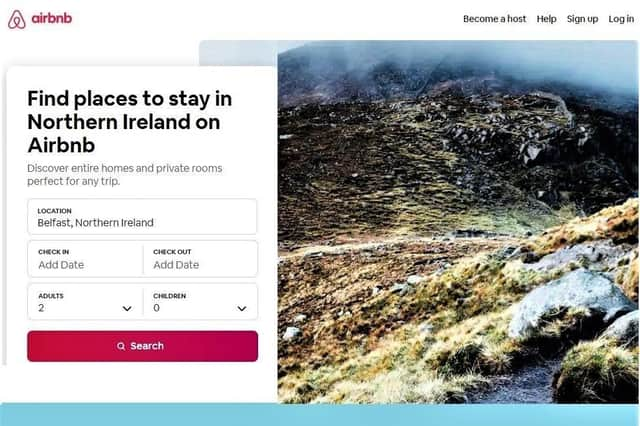Global holiday giant Airbnb speaks up amid growing calls to curb lettings in NI


Airbnb, which was founded in 2008 in San Francisco, is facing the beginnings of a campaign of opposition to the spread of its properties in Belfast, and by extension, the whole of the Province.
Airbnb basically allows householders to advertise their homes – ranging from tiny flats to stately mansions – as being available for rent via its glossy worldwide website.
It then takes a cut of any bookings which are made.
Advertisement
Hide AdAdvertisement
Hide AdIn the last week, Belfast SDLP councillor Gary McKeown has led calls for a licensing system for Airbnbs in the city – something which will be debated by the council on Monday.
Basically, he envisions capping the numbers of Airbnbs in certain areas.
His complaints are twofold.
Firstly, he fears that turning inner-city houses into short-term holiday rentals makes it harder for locals to obtain homes.
And secondly, short-term guests can be much more noisy and disruptive than long-term tenants.
Advertisement
Hide AdAdvertisement
Hide AdHis motion calls on the council to write to Stormont, requesting that MLAs look into “a robust and effective regulatory and licensing system”.
Airbnb has now responded, saying: “NI already has rules for tourist accommodation, and we recently put forward proposals for a strengthened system to protect housing, and promote the sustainable growth of home-sharing, that are being taken forward by the UK government.”
The firm said “only a tiny fraction” of any given community is made up of Airbnbs, and “nearly half” of UK hosts consider their Airbnb income to be “an economic lifeline”.
SO WHAT ARE THE ACTUAL RULES RIGHT NOW?
Currently, tourism accommodation in Northern Ireland need a certificate from Tourism NI.
Advertisement
Hide AdAdvertisement
Hide AdThese are valid for four years, and involve an inspection of the property.
Anyone who operates without a valid certificate faces a fine of up to £2,500, or imprisonment for six months – or both.
For the last two years, Airbnb has also advocated what it calls “a clear, modern and simple registration system for short-term rentals in UK cities” – something which sounds somewhat similar to councillor McKeown’s licencing proposal.
Airbnb has said that at present, the system is “fragmented,” with different rules across the UK’s nations.
For example, Airbnb says:
Advertisement
Hide AdAdvertisement
Hide Ad“Hosts in Greater London are subject to a night limit restriction and may not let their space for short-term stays more than 90 nights in a calendar year without planning permission from their local authority.
“Hosts in Northern Ireland must register with the local tourism authority.
“This is a law that predates the existence of home-sharing platforms or the widespread use of the internet, as it was passed in 1992.
“The Scottish Government has proposed licensing and planning requirements for short-term lets that will be devolved to each of the 32 local authorities across the country.”
Advertisement
Hide AdAdvertisement
Hide AdThe firm is also calling on the government to “issue new planning guidance on distinguishing between commercial short-term letting activity and non-commercial/amateur short-term letting activity”.
It adds that “we believe that the standard definition of ‘commercial activity’ should be properties occupied for short-term lets over 140 nights per year”.
In other words, if an Airbnb owner keeps the level of renting to below 38% of the year, they will not be classed as commercial.
Advertisement
Hide AdAdvertisement
Hide AdA message from the Editor:
Thank you for reading this story on our website. While I have your attention, I also have an important request to make of you.
With the coronavirus lockdown having a major impact on many of our advertisers - and consequently the revenue we receive - we are more reliant than ever on you taking out a digital subscription.
Subscribe to newsletter.co.uk and enjoy unlimited access to the best Northern Ireland and UK news and information online and on our app. With a digital subscription, you can read more than 5 articles, see fewer ads, enjoy faster load times, and get access to exclusive newsletters and content. Visit https://www.newsletter.co.uk/subscriptionsnow to sign up.
Advertisement
Hide AdAdvertisement
Hide AdOur journalism costs money and we rely on advertising, print and digital revenues to help to support them. By supporting us, we are able to support you in providing trusted, fact-checked content for this website.
Ben Lowry
Editor